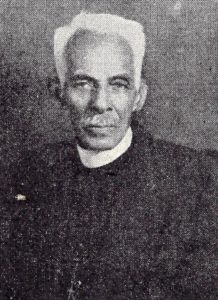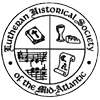 Rev. Daniel Wiseman (1858-1942) served the Evangelical Lutheran Church of Our Redeemer in Washington, D. C., from its founding until his death in 1942. The first Lutheran African-American pastor in the nation’s capital, he was the only one during his lifetime. Although not the first Lutheran African-American pastor east of the Alleghenies, no other served as long or as successfully as he did.
Rev. Daniel Wiseman (1858-1942) served the Evangelical Lutheran Church of Our Redeemer in Washington, D. C., from its founding until his death in 1942. The first Lutheran African-American pastor in the nation’s capital, he was the only one during his lifetime. Although not the first Lutheran African-American pastor east of the Alleghenies, no other served as long or as successfully as he did.
A faithful, loyal, and beloved pastor, he served all the spiritual needs of his congregation. In addition he led, or spoke for, more than a dozen civic organizations. For twenty years he chaired the Lucretia Mott Elementary School Parent and Teacher Association, the Howard Park Civic Association, and a variety of Howard University Alumni Associations. For thirty years he was a Director of the District’s Anti-Tuberculosis Committee. In addition to these long-term commitments, he organized and raised funds for summer camps, war bonds, hospitals, the unemployed, and veterans, among others. Throughout his career, he was a member of the District’s Interdenominational Ministerial Union. This organization of African-American pastors promoted spiritual growth among its members and actively participated in the religious and political life of the city, including resistance to white supremacy and Jim Crow practices.
Born in St. Thomas, Danish West Indies, Wiseman immigrated to Brooklyn, New York, as a teenager, attending high school there and joining St. Matthew’s (English) Lutheran Church. General Synod pastors Michael W. Hamma (1836-1913) and John George Butler (1826-1909), recognizing Wiseman’s potential, persuaded him to attend Howard University’s Theological Department. Graduated in 1884 he started a Sunday School soon thereafter leading to the establishment of Our Redeemer Lutheran church in 1885. The Maryland Synod ordained him in 1886. One of Howard University’s most distinguished theological graduates, he received honorary degrees from the University in 1909 and 1924. For his work among the poor and dispossessed, he became known as the “mayor of the city’s neglected element.” The centennial history of the Maryland Synod characterized Wiseman and his congregation this way: “The church, though small from the standpoint of membership, has stood in the forefront in all movements for the welfare of humanity. It has not only preached a gospel of regeneration, repentance, and faith as being essential in the making of Christians for the other world, but it has tried to instill in the minds of its members and hearers the necessity of these things for the present as well as for the life to come.”
-Phil Teigen
Picture source: Report of the Annual Convention of the Evangelical Lutheran Synod of Maryland for 1943, p. 47.
